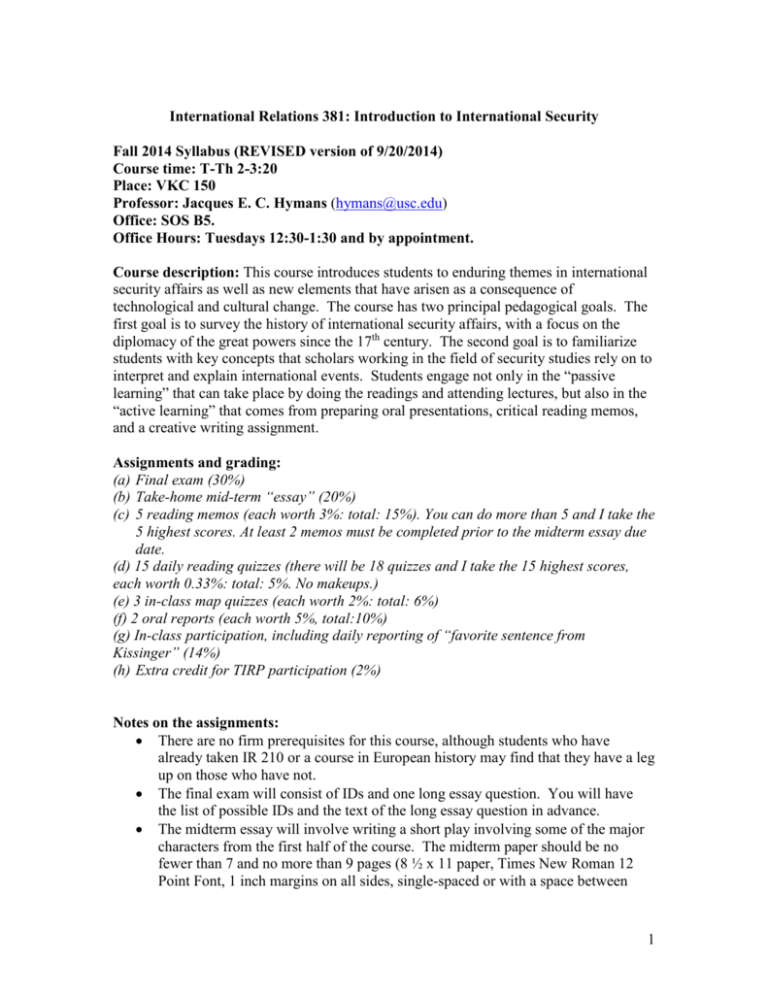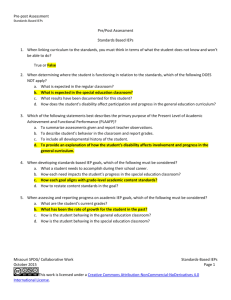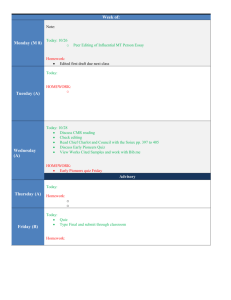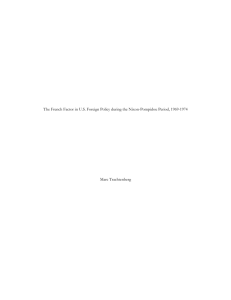Fall 2014 syllabus - Personal World Wide Web Pages
advertisement

International Relations 381: Introduction to International Security Fall 2014 Syllabus (REVISED version of 9/20/2014) Course time: T-Th 2-3:20 Place: VKC 150 Professor: Jacques E. C. Hymans (hymans@usc.edu) Office: SOS B5. Office Hours: Tuesdays 12:30-1:30 and by appointment. Course description: This course introduces students to enduring themes in international security affairs as well as new elements that have arisen as a consequence of technological and cultural change. The course has two principal pedagogical goals. The first goal is to survey the history of international security affairs, with a focus on the diplomacy of the great powers since the 17th century. The second goal is to familiarize students with key concepts that scholars working in the field of security studies rely on to interpret and explain international events. Students engage not only in the “passive learning” that can take place by doing the readings and attending lectures, but also in the “active learning” that comes from preparing oral presentations, critical reading memos, and a creative writing assignment. Assignments and grading: (a) Final exam (30%) (b) Take-home mid-term “essay” (20%) (c) 5 reading memos (each worth 3%: total: 15%). You can do more than 5 and I take the 5 highest scores. At least 2 memos must be completed prior to the midterm essay due date. (d) 15 daily reading quizzes (there will be 18 quizzes and I take the 15 highest scores, each worth 0.33%: total: 5%. No makeups.) (e) 3 in-class map quizzes (each worth 2%: total: 6%) (f) 2 oral reports (each worth 5%, total:10%) (g) In-class participation, including daily reporting of “favorite sentence from Kissinger” (14%) (h) Extra credit for TIRP participation (2%) Notes on the assignments: There are no firm prerequisites for this course, although students who have already taken IR 210 or a course in European history may find that they have a leg up on those who have not. The final exam will consist of IDs and one long essay question. You will have the list of possible IDs and the text of the long essay question in advance. The midterm essay will involve writing a short play involving some of the major characters from the first half of the course. The midterm paper should be no fewer than 7 and no more than 9 pages (8 ½ x 11 paper, Times New Roman 12 Point Font, 1 inch margins on all sides, single-spaced or with a space between 1 each speaker). Specific advice on the form and substance of the play, including footnoting expectations, will be given in class. The essays are due, in hard copy only, at the beginning of class on the due date. Late papers will be graded down one half letter grade (e.g., from B+ to B) for every 12 hours they are late. Your 1-page reading memos are due at the start of class on the same day as the required reading assignments. You choose which days to turn in a memo, but you must complete at least two memos prior to midterm essay due date. If you fail to turn in at least two memos prior to that date, you will receive a zero for the unwritten memos, regardless of how many memos you write in the second half of the course. The memos must be no longer than a single page, no smaller than 12 point font, 1-inch margins. Their organization should be as follows, in this order (number your answers): (1) What is the definition the author offers for the “key concept” that is indicated on the syllabus? [Note: Sometimes the definition is left implicit or is complicated and you have to clarify it with your own words.] (2) How can this concept help to explain the “historical case” discussed in the required reading (usually Kissinger)? (3) How does it fall short in that explanation? The reading quizzes will test your retention of basic information from the required readings for that day: big events, names, dates. If you read carefully, you will do fine. I will not quiz you on obscure information that is only mentioned in passing. The map quizzes will involve filling in a blank map with correct information. All information required for the map quizzes will be handed out to the class prior to the quiz day. The oral reports will be carefully timed 7 minute powerpoint presentations by teams of 2 students. In your first report, you explain the previous class day’s “key concept” in your own words, based on a close reading of the previous day’s memo reading and close listening to the previous lecture, and you apply the concept to the previous day’s historical case. You can think of this report as a summary of the previous day’s course content. In your second report, you apply the previous class day’s “key concept” (a different one from the one you covered in the 1st report) to an international security issue currently in the news. Use the New York Times, Washington Post, LA Times, Economist, or other major print news outlets as your principal sources of information. The structure of the presentations should be the following: (1) What is the key concept and its definition? (2) What is the historical event? What are the principal actors involved and what are the stakes? (3) How can we apply the concept to better understand this event? The class participation score reflects questions and comments made in class, including questions to the oral report givers, and you get extra points for sending in your “favorite sentence” from the Kissinger chapter that you have to read for the upcoming class. For the “favorite sentence” assignment, just send me an email containing your favorite sentence (or short passage) from the reading, noting the page number, at least 2 hours before the start of class. I use a 15 point scale to grade assignments. 15 is equivalent to an A, 14 is equivalent to an A-, 13 is an A-/B+, 12 is a B+, 11 is a B, 10 is a B-, 9 is a B-/C+, and so on. 2 Basic required texts (purchase at the campus bookstore): Henry Kissinger, Diplomacy (Simon and Schuster, 1994). Scott D. Sagan and Kenneth N. Waltz, The Spread of Nuclear Weapons: An Enduring Debate (3rd edition, W. W. Norton, 2012). (MAKE SURE YOU HAVE THE THIRD EDITION, NOT EARLIER EDITIONS) The other readings (notably the International Encyclopedia of Political Science, IEPS) are available online either through USC libraries or, in rare cases, another indicated website. Class Meeting Topics and Reading Assignments: Class meeting 1 (8/26). Introduction to the course. Readings: no readings. Class meeting 2 (8/28): Practice reading quiz. Historical case: The post-Cold War world. Key concept: Balance of power. Required reading: Kissinger, Chapter 1 (pp. 17-28). Required reading 2: Richard Little, “Balance of Power,” in IEPS online. Class meeting 3 (9/2): Reading quiz 1. Historical case: From the Roman Empire to the Thirty Years’ War. Key concepts: The modern state. Required reading: Kissinger, Chapter 3 (pp. 56-77). Required reading 2: Gianfranco Poggi, “State,” in IEPS online. Class meeting 4 (9/4): Reading quiz 2. Historical case: War and peace in the European states system, 1648-1854. Key concept: International regimes. Required reading: Kissinger, Chapter 4 (pp. 78-102). Required reading 2: Ben Kamis and Andreas Hasenclever, “International Regimes,” in IEPS online. Class meeting 5 (9/9). Reading quiz 3. Historical case: The rise of Prussia/Germany, 1848-1871. Key concept: Political leadership. Required reading: Kissinger, Chapter 5 (pp. 103-136). Required reading 2: Luca Verzichelli, “Leadership,” in IEPS online. Class meeting 6 (9/11). Map quiz 1 (Africa). 3 Historical case: Europe’s rise to worldwide dominance. Key concept: Industrialization. Required reading: Daniel R. Headrick, “The Tools of Imperialism: Technology and the Expansion of European Colonial Empires in the Nineteenth Century,” The Journal of Modern History Vol. 51, No. 2 (Jun., 1979), pp. 231-263. Required reading 2: Isaias R. Rivera, “Industrialization,” in Encyclopedia of Global Studies, available through USC Libraries online. Class meeting 7 (9/16): Reading quiz 4. Historical case: The long fuse to World War I. Key concept: Multipolarity. Required reading: Kissinger, Chapter 7 (pp. 168-200). Required reading 2: Adrian Hyde-Pierce, “Bipolarity and Multipolarity,” in IEPS online. Class meeting 8 (9/18): Map quiz 2 (WWI alliances). Historical case: The triggering of World War I. Key concept: Crisis management. Required reading: Kissinger, Chapter 8 (pp. 201-217). Required reading 2: Arjen Boin, “Crisis Management,” in IEPS online. Class meeting 9 (9/23): Reading quiz 5. Historical case: The expansion of the United States. Key concept: Political culture. Required reading: Kissinger, Chapter 2 (pp. 29-55). Required reading 2: Yves Schemeil, “Culturalism,” in IEPS online. Class meeting 10 (9/25): Reading quiz 6. Historical case: The Versailles Conference. Key concept: Liberalism. Required reading: Kissinger, Chapter 9 (pp. 218-245). Required reading 2: Michael Doyle and Stefano Recchia, “Liberalism in International Relations,” in IEPS online. Class meeting 11 (9/30): Reading quiz 7. Historical case: The resurgence of Germany; World War II in Europe. Key concept: Nationalism and irredentism. Required reading: Kissinger, Chapters 11 and 12 (pp. 266-318). Required reading 2: Thomas Ambrosio, “Irrendentism,” in IEPS online. Class meeting 12 (10/2): Reading quiz 8. 4 Historical case: The birth of the Soviet Union. Key concept: Communism. Required reading: Kissinger, Chapter 13-14 (pp. 332-368). Required reading 2: Marc Lazar, “Communism,” in IEPS online. Class meeting 13 (10/7): Reading quiz 9. Historical case: The rise of Japan and World War II in Asia. Key concept: Imperialism. Required reading: Kenneth Pyle, “Advantages of Followership: German Economics and Japanese Bureaucrats, 1890-1925,” Journal of Japanese Studies, Vol. 1, No. 1 (Autumn, 1974), pp. 127-164. Required reading 2: Siba N. Grovogui, “Imperialism,” in IEPS online. SPECIAL CLASS MEETING WEDNESDAY, OCTOBER 8, 12-2 PM: Center for International Studies Panel discussion on 50 Years after the Tonkin Gulf Incident, featuring Tuong Vu (Oregon) and David Elliott (Pomona). Attendance is not required, but students who come and write a summary of the event by 10/14 will get full reading memo credit. Class meeting 14 (10/9): (no class today--session moved back one day to 10/8) Class meeting 15 (10/14): Mid-term “essays” are due at the start of class today. Historical case: Hiroshima and Nagasaki. Key concept: Nuclear weapons. Required reading: J. Samuel Walker, “Recent Literature on Truman's Atomic Bomb Decision: A Search for Middle Ground,” Diplomatic History (2005) Vol. 29, No. 2, pp. 311-334. Required reading 2: “The Effects of Nuclear Weapons” (24 web pages) starting with http://www.atomicarchive.com/Effects/effects1.shtml Class meeting 16 (10/16): Reading quiz 10. Historical case: The onset of the Cold War. Key concept: Arms races. Required reading: Kissinger, Chapter 17 (pp. 423-445). Required reading 2: Sam Perlo-Freeman, “Arms Race,” in IEPS online. Class meeting 17 (10/21): Reading quiz 11. Historical case: The nonaligned states in the Cold War. Key concept: Dimensions of power. Required reading: Kissinger, Chapter 21 (pp. 522-549). Required reading 2: Stefano Guzzini, “Power and International Politics,” in IEPS online. 5 Class meeting 18 (10/23): Reading quiz 12. Historical case: Cold War relations inside the blocs. Key concept: Public goods provision. Required reading: Kissinger, Chapter 22 and 24 (pp. 550-567, 594-619). Required reading 2: Paolo Martelli, “Common goods,” in IEPS online. Class meeting 19 (10/28): Reading quiz 13. Historical case: The Vietnam War. Key concept: Public opinion. Required reading: Kissinger, Ch. 27 (pp. 674-702). Required reading 2: Ilvo Diamanti, “Public opinion,” in IEPS online. Class meeting 20 (10/30): IN-CLASS PRESENTATION OF BEST MIDTERM PLAYS. Class meeting 21 (11/4): Map quiz 3 (Post-Soviet space). Historical case: The end of the Cold War. Key concept: State failure/collapse. Required reading: Kissinger, Chapter 30 (pp. 762-803). Required reading 2: Abdulahi Osman, “State collapse,” in IEPS online. Class meeting 22 (11/6): GUEST LECTURER: CAROL ATKINSON No quiz today. Historical case: US-China relations in the post-Cold War world. Key concept: Cooperation. Required reading: Henry A. Kissinger, “The Future of US-China Relations: Conflict is a Choice, not a Necessity,” Foreign Affairs Vol. 91, No. 2 (March-April 2012), starting on p. 44, available through USC Libraries. Required reading 2: Josep M. Colomer, “Cooperation,” in IEPS online. Class meeting 23 (11/11): Reading quiz 14. Historical case: The consequences of nuclear proliferation. Required reading: Sagan and Waltz, ch. 1. Required reading 2: Jacques E. C. Hymans, “Nuclear Proliferation and Nonproliferation,” in Encyclopedia of Political Science online (not IEPS) Class meeting 24 (11/13). Reading quiz 15. Historical case: The consequences of nuclear proliferation. Required reading: Sagan and Waltz, ch. 2. Class meeting 25 (11/18): 6 Reading quiz 16. Historical case: The consequences of nuclear proliferation. Required reading: Sagan and Waltz, chs. 3-4. Class meeting 26 (11/20): Reading quiz 17. Historical case: The consequences of nuclear proliferation. Required reading: Sagan and Waltz, chs. 5-6. Class meeting 27 (11/25): Class canceled. Happy Thanksgiving week! 11/27: No class. Happy Thanksgiving! Class meeting 28 (12/2): Reading quiz 18. Historical case: The consequences of nuclear proliferation. Required reading: Sagan and Waltz, ch. 7. Required reading 2: Francis J. Gavin, “Politics, History and the Ivory Tower-Policy Gap in the Nuclear Proliferation Debate,” Journal of Strategic Studies Vol. 35, No. 4 (2012), pp. 573-600. Class meeting 29 (12/4): Class wrap-up and prep for final. Cheat sheets will be handed out in class. FINAL EXAM: Thursday 12/11, 2-4 PM USC Statement on Academic Conduct and Support Systems Academic Conduct Plagiarism – presenting someone else’s ideas as your own, either verbatim or recast in your own words – is a serious academic offense with serious consequences. Please familiarize yourself with the discussion of plagiarism in SCampus in Section 11, Behavior Violating University Standardshttps://scampus.usc.edu/1100behavior-violating-university-standards-and-appropriate-sanctions/. Other forms of academic dishonesty are equally unacceptable. See additional information in SCampus and university policies on scientific misconduct, http://policy.usc.edu/scientific-misconduct/. Discrimination, sexual assault, and harassment are not tolerated by the university. You are encouraged to report any incidents to the Office of Equity and Diversity http://equity.usc.edu/ or to the Department of Public Safety http://capsnet.usc.edu/department/department-public-safety/online-forms/contactus. This is important for the safety whole USC community. Another member of the university community – such as a friend, classmate, advisor, or faculty member – can help initiate the report, or can initiate the report on behalf of another person. The Center for Women and Men http://www.usc.edu/student-affairs/cwm/ provides 24/7 confidential support, and the sexual assault resource center webpage sarc@usc.edu describes reporting options and other resources. 7 Support Systems A number of USC’s schools provide support for students who need help with scholarly writing. Check with your advisor or program staff to find out more. Students whose primary language is not English should check with the American Language Institute http://dornsife.usc.edu/ali, which sponsors courses and workshops specifically for international graduate students. The Office of Disability Services and Programs http://sait.usc.edu/academicsupport/centerprograms/dsp/home_index.htmlprovides certification for students with disabilities and helps arrange the relevant accommodations. If an officially declared emergency makes travel to campus infeasible, USC Emergency Information http://emergency.usc.edu/will provide safety and other updates, including ways in which instruction will be continued by means of blackboard, teleconferencing, and other technology. 8







